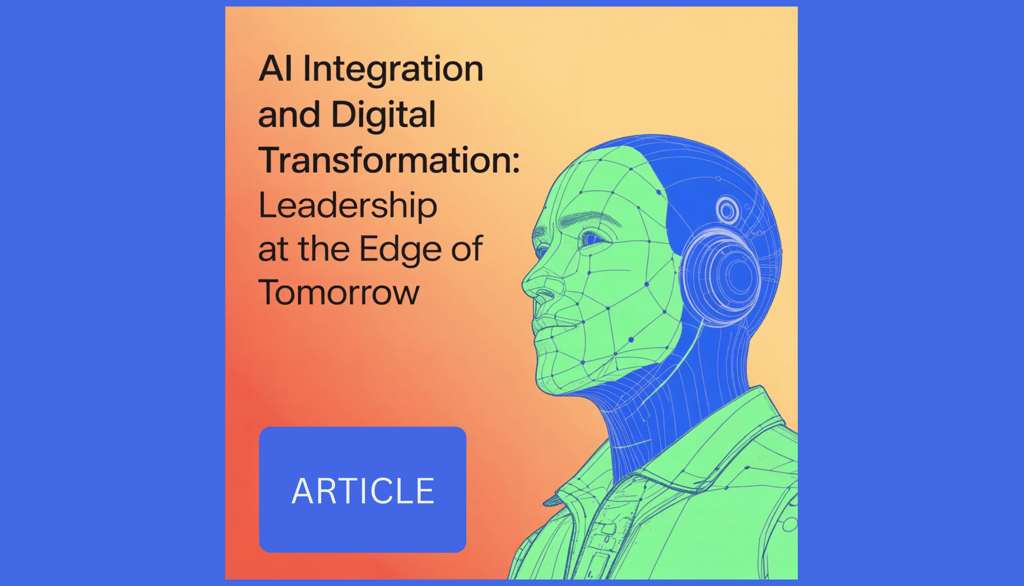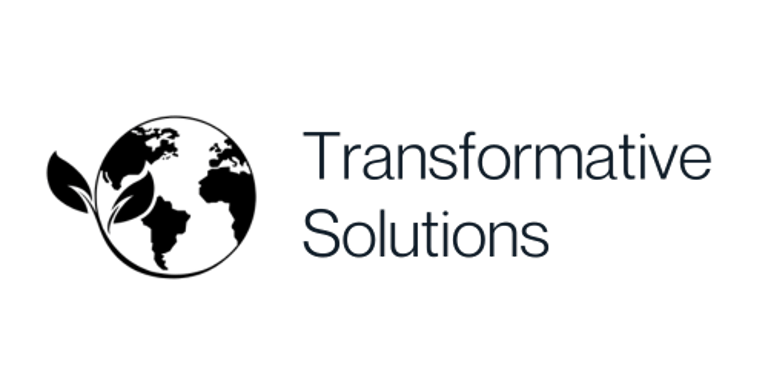AI Integration and Digital Transformation: Leadership at the Edge of Tomorrow
Artificial Intelligence is reshaping leadership—evolving from a technical tool into a true strategic partner. In this powerful article we explore how digital transformation is revolutionizing the way leaders think, decide, and serve. Through nine transformative themes that explore: • The rise of intelligent organizations and data-driven decision-making • How AI enhances leadership coaching without losing the human touch • The ethical and spiritual responsibilities of tech-empowered leaders • Why the future belongs to those who can balance innovation with inner wisdom • The shift from automation to augmentation—and from disruption to regeneration Whether you're an executive, coach, entrepreneur, or curious learner, this episode will leave you inspired to lead at the intersection of intelligence, compassion, and conscience. This isn’t just about adapting to change. It’s about leading the change—with vision, integrity, and soul.
LEADERSHIP & COACHING
6/28/20257 min read


AI Integration and Digital Transformation: Leadership at the Edge of Tomorrow
In an era marked by accelerating change, where disruption has become the norm and certainty a rarity, leaders stand at the precipice of a new frontier—one shaped by artificial intelligence and the sweeping force of digital transformation. No longer confined to tech departments or innovation labs, AI has emerged as a strategic partner, reshaping how decisions are made, teams are managed, and organizations evolve. At this moment, leadership itself is being redefined.
This is not simply about adopting new technologies. It’s about a radical shift in mindset—a transformation in how we lead, how we think, and how we create value in a world that is increasingly automated, algorithmic, and interconnected. To lead in this new age is to learn to collaborate with machines, to trust data while honouring human wisdom, and to navigate complexity with both agility and integrity.
Let us journey through this landscape together.
Part I: The Rise of the Intelligent Organization
Artificial Intelligence is no longer speculative fiction. It is here—in our phones, our workflows, our meetings, our markets. From predictive analytics and machine learning to natural language processing and robotic process automation, AI has quietly infiltrated the very infrastructure of work.
Forward-thinking organizations are evolving into what we might call “intelligent organizations.” These are enterprises that harness AI not as a novelty, but as an essential force—one that powers everything from customer insights and operational optimization to innovation and talent development.
In intelligent organizations, data flows as freely as ideas. Decisions are augmented, not replaced, by machines. And leaders are no longer just decision-makers—they are sense-makers, integrators of complexity, architects of meaning.
Reflection: In what ways is your organization already intelligent—and where is it still analogue in its thinking?
Part II: AI as a Strategic Partner in Leadership
It is easy to view AI as a tool—a means to an end. But the most profound shift occurs when leaders begin to see AI not just as a tool, but as a strategic partner.
Consider the executive who uses AI to sift through thousands of customer reviews in real time to detect emerging trends. Or the coach who uses sentiment analysis to better understand team morale. Or the HR leader using predictive analytics to identify high-potential employees at risk of burnout.
These are not distant scenarios—they are the lived realities of today’s pioneering leaders. When AI is embedded into strategic planning, decision-making, and performance management, it elevates leadership from reactive to anticipatory.
But here’s the paradox: As AI grows more intelligent, human leadership must grow more intuitive.
Reflection: How might you partner with AI to make better decisions—while still trusting your gut?
Part III: Data-Driven Coaching and the Human Element
One of the most promising intersections between leadership and AI lies in coaching. With real-time feedback loops, biometric data, performance analytics, and personalized learning platforms, leaders can now offer their teams coaching that is precise, adaptive, and evidence-based.
But let us not mistake data for understanding. The soul of coaching lies in empathy, presence, and insight—qualities that no algorithm can replicate. What AI can do is offer patterns; what leaders must do is find meaning within them.
We now live in an age of augmented leadership—where human wisdom is amplified by digital intelligence. Leaders who can marry data with dialogue, dashboards with deep listening, are the ones who will cultivate thriving, high-performance cultures.
Reflection: What data could make your coaching more impactful—and how might you ensure that it still feels deeply human?
Part IV: Ethical Oversight and Responsible Innovation
As AI grows in power and ubiquity, so too does the need for ethical leadership. The same technology that can enhance hiring can also reinforce bias. The same algorithms that drive efficiency can also create opacity and detachment.
This is where conscious digital transformation becomes critical.
Ethical AI is not just about regulatory compliance—it’s about leadership values. Are we using AI to manipulate or to serve? To control or to empower? Leaders must now operate as guardians of transparency, inclusivity, and fairness in an environment where algorithms can make life-altering decisions in milliseconds.
In this age, the moral compass of an organization is more important than ever—and it must be held not just by ethicists or compliance officers, but by every leader who touches technology.
Reflection: What ethical principles guide your use of AI? Who is responsible for ensuring fairness and accountability?
Part V: Agility in a Digitally Transformed World
Digital transformation is not a project. It is a continuous process—a living shift in how organizations think, operate, and evolve. AI is one driver, but it must be woven into a broader fabric of agility, adaptability, and cultural readiness.
To lead in a digitally transformed world is to lead at the speed of change. It requires flattening hierarchies, speeding up decision cycles, breaking down silos, and empowering cross-functional teams.
More than anything, it requires courage—to experiment, to fail fast, to learn faster.
Digitally mature organizations don’t just digitize what exists. They reimagine what’s possible. And leaders must be willing to question long-standing assumptions and rewrite outdated playbooks.
Reflection: What structures or mindsets in your organization must evolve for digital transformation to take root?
Part VI: The Inner Transformation of the Leader
Let us not forget: transformation is not only external. As our systems evolve, so too must our inner capacities.
The digital leader of tomorrow is not merely tech-savvy. They are self-aware, emotionally intelligent, and spiritually grounded. They can hold paradox, embrace uncertainty, and lead with both precision and purpose.
In this space, personal transformation becomes the foundation for digital transformation. Leaders must build digital confidence without losing human compassion. They must trust in tools while cultivating inner wisdom.
As we integrate AI more deeply into our leadership, we must also integrate our own being—mind, heart, and spirit.
Reflection: What inner capacities must you strengthen to lead in a world shaped by AI?
Part VII: From Automation to Augmentation—Redefining Human Value
As AI systems become more capable of performing tasks once reserved for humans—data analysis, diagnostics, content creation, even elements of coaching—it raises an important and pressing question:
What is the unique value of the human being in a digitized world?
For leaders, this is not just a philosophical inquiry—it is a practical imperative. The rise of AI challenges us to shift from a mindset of automation to one of augmentation. Instead of asking what can be replaced, we must ask: what can be elevated?
When we design work around what machines do best—speed, repetition, scale—and what humans do best—empathy, judgment, creativity—we unlock new models of collaboration. We move from fear of obsolescence to the excitement of co-evolution.
The future of leadership lies in understanding not just technology, but the irreducible essence of the human spirit. That is where real value will be created.
Reflection: In your role, how can you shift focus from replacing to augmenting human potential?
Part VIII: Spiritual Intelligence in the Age of Artificial Intelligence
In this moment of unprecedented advancement, we are confronted not only with new capabilities, but with new responsibilities. AI can help us do more, faster. But it cannot tell us why we should do it—or whether we should do it at all.
This is where the role of spiritual intelligence becomes essential.
To lead with integrity in the digital age, one must cultivate an inner compass—grounded in purpose, humility, service, and justice. Without this anchor, technology can drift toward exploitation, surveillance, or dehumanization. But when guided by spiritual values, it becomes a tool for upliftment, equity, and progress.
Spiritual intelligence is not about religion—it is about meaning, interconnection, and ethical clarity. It is the ability to perceive the deeper implications of our choices, to honor the dignity of every soul, and to lead with reverence for the unseen forces that bind us together.
As Bahá’í teachings remind us, true progress is both material and spiritual. AI must serve not just the mind, but the heart and conscience.
Reflection: What spiritual principles can guide your leadership decisions in this transformative era?
Part IX: Designing the Future: Inclusion, Resilience, and Regeneration
Finally, dear friend, we must consider the world we are co-creating.
Digital transformation is not merely about digitizing the past—it is about designing the future. And the future we design must be inclusive, resilient, and regenerative.
Inclusive, because algorithms trained on biased data will reproduce inequality unless we consciously intervene.
Resilient, because in a world of constant disruption, our systems—and our people—must be adaptive, flexible, and emotionally strong.
And regenerative, because our technologies must not deplete our humanity, our ecosystems, or our communities—they must revitalize them.
As leaders, we are architects of possibility. AI is one of our tools, but the blueprint must come from a deeper place—a vision of society where technology amplifies compassion, where progress uplifts all, and where every innovation is rooted in justice and love.
This is not a distant dream. It is a design challenge. And it begins with leadership.
Reflection: If you could redesign your organization from scratch using today’s tools, how would you make it more inclusive, resilient, and regenerative?
Conclusion: Leadership Beyond the Threshold
As we’ve journeyed through the evolving landscape of artificial intelligence and digital transformation, one truth becomes undeniable: we are crossing a threshold—not only technologically, but spiritually, ethically, and collectively.
AI is not just altering how we work; it is challenging us to rethink what it means to be human. It is inviting us to rediscover our essential qualities—empathy, purpose, moral courage, and imagination—and to integrate these with tools that can extend our reach and accelerate our impact.
This is not a time to retreat from complexity. It is a time to rise to it—with discernment, humility, and hope.
The leaders who will shape the future are those who can:
• Leverage AI without losing sight of human dignity,
• Harness data without sacrificing wisdom,
• Lead transformation while remaining anchored in timeless principles,
• And reimagine systems in service of justice, inclusion, and regeneration.
We are being called to a higher standard of leadership—one that is technically capable, emotionally intelligent, ethically grounded, and spiritually awakened.
This is the frontier: a place where artificial intelligence meets spiritual intelligence, and where leadership is no longer about command and control—but about co-creation and collective upliftment.
So let us move forward, not just as adopters of technology, but as designers of a future worthy of our highest aspirations.
Let us lead boldly, wisely, and compassionately—at the edge of possibility.
EMPOWERMENT
Unlocking potential through innovative learning solutions.
Growth
Excellence
Eric: +27 83 429 3294
Nxobile: +27 67 498 8551
© 2025. All rights reserved.
